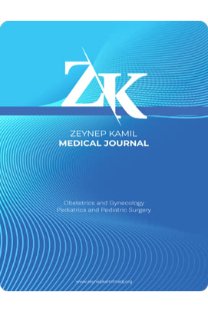Epilepside Gebelik, Doğum ve Doğum Sonu Sürecin Yönetimi ve Bakımı
Epilepsi, prekonsepsiyonel yaklaşım, gebelik, doğum eylemi, doğum sonu dönem
Management and Care of Epilepsy During Pregnancy, Birth and Postpartum
Epilepsy, preconceptional approach, pregnancy, birth, postpartum period,
___
- KAYNAKLAR 1. Kutlu G, Erdal A, Aydoğan S, B. Gomceli Y, E.İnan L. Gebelik Sırasında Epilepsili Kadınların Takip ve Tedavisi. Journal of Neurological Sciences (Turkish) 2012; 29:(3):527-534.
- 2. Aykut Bingöl C.(Ed.) Epilepsi Rehberi Türk Epilepsi ile Savaş Derneği. Epilepsi Dergisi 2012; 18(1):26-38.
- 3. Görgülü Ü, Fesci H. Epilepsi ile Yaşam: Epilepsinin Psikososyal Etkileri. Göstepe Tıp Dergisi 2011; 26 (1): 27-32.
- 4. Adadıoğlu Ö, Oğuz S. Epilepsi ve Öz Bakım. Epilepsi Dergisi 2016; 22 (1):1-4.
- 5. Akdağ G, İ. Algın D, O. Erdinç O. Epilepsi. Osmangazi Tıp Dergisi 2016; 38 (özel sayı 1): 35-41.
- 6. Ataklı D. Gebelik ve Epilepsi. Epilepsi 2002;8(2): 113-119 http://www.journalagent.com/epilepsi/pdfs/epilepsi_8_2_113_119.pdf, Erişim tarihi: 29 Nisan 2017
- 7. Toklu Z. Epilepside Tedavi Stratejileri. Kocatepe Tıp Dergisi 2015, Nisan; 16: 147-150.
- 8. Coşkun A. Prekonsepsiyonel Bakım ve Danışmanlık: Kadın Yaşamındaki Yeri ve Önemi. Hemşirelikte Eğitim ve Araştırma Dergisi 2012; 8 (3): 8-15.
- 9. Başgöl Ş, Oskay Ü. Prekonsepsiyonel Dönemde ve Gebelikte Kanıt Temelli Yaklaşımlar. International Journal of Human Sciences 2012; 9 (2),-1524-1534
- 10. Madazlı R, Öncül M, Albayrak M, Uludağ S, Eşkazan E, Ocak V. Gebelik ve Epilepsi 44 Olgunun Değerlendirilmesi. Cerrahpaşa Tıp Dergisi 2004; cilt(sayı) 35(3).
- 11. Kutlu G, B. Gömceli Y, Sönmez T, Sanıvar F, E. İnan L. Epileptik Kadınların Gebelik Sırasında Takip ve Tedavisi 2007;13(2-3): 83-86.
- 12. Erten N, Erişgin Z. Gebelikte Epilepsi Tedavisinde Yeni Nesil Antiepileptik İlaçlar. Harran Üniversitesi Tıp Fakültesi Dergisi 2014; 11 (3): 297-303.
- 13. Baysoy NG, Özkan S. Gebelik Öncesi (Prekonsepsiyonel) Bakım: Halk Sağlığı Perspektifi. Gazi Med.J. 2012; 23: 77-90.
- 14. Ahmad AEpilepsy: Clinical Considerations In Women Of Childbearing Age. Bangladesh Journal of Medical Science 2013, 4 october; Vol. 12 No, 364-369.
- 15. Wide K, Winbladh B, Tomson T, Kalen B. Body Dimensions of Infants Exposed to Antiepileptic Drugs In Utero: Observations Spanning 25 Years. Epilepsia.2000; 41(7):854-861.
- 16. Wilson RD, Davies G, Desilets V, Reid GJ, et al. The Use of Folic Acid fort he Prevention of Neural Tube Defects and Other Congenital Anomalies. J.Obstet GynaecolCan.2003; 25 (11):959-73.
- 17. Borgelt LM, Hart FM, Bainbridge JL. Epilepsy During Pregnancy: Focus on Management Strategies. Int J Womens Health, Sep 2016);19 (8): 505-517.
- 18. Thomas SV. Managing Epilepsy in Pregnancy. Neurol India, 2011; 59 (1): 59-65.
- 19. Adab N. ,W. Chadwick DReview Management of women with epilepsy during pregnancy, The Obstetrician & Gynaecologist 2006; 8: 20–25.
- 20. Rauchenzauner M, Ehrensberger M, Prieschl M, Kapelari K, et alGeneralized Tonic-Clonic Seizures and Antiepileptic Drugs During Pregnancy-a Mater of İmportance Fort he Baby? J. Neurol.2013; 260 (2):484-488.
- 21. Borthen I, Eide MG, Daltveit AK, Gilhus NE. Delivery Outcome of Women With Epilepsy: A population-based Cohort Study. BJOG 2010; 117:1537-1543 http://dx.147105528.2010.02694.xPMid:20716254, Erişim tarihi: 29 Nisan 2017 22. Veiby G, Daltveit AK, Engelsen BA, Gilhus NE. Pregnancy, delivery and Outcome fort he Child in Maternal Epilepsy. Epilepsia, 2009; 50(9): 2130-2139.
- 23. Ikonomidoua C, Turski L Antiepileptic Drugs and Brain Development. Epilepsy Research, 2010; 88 (1):11-22.
- 24. Bayrak M, Bozdağ H, Karadağ C, Günay T, Göynümer G. Epilepsi Tanılı Gebelerde Obstetrik ve Perinatal Sonuçların Retrospektif Analizi. İKSST Dergisi 2014; 6(3): 127-132.
- 25. Bebek N, Baykan B. Epilepsilerin Genetik Yönü ve İdyopatik Epilepsi Genetiğinde Son Gelişmeler, Journal of Neurological Sciences 2006; 23 (2): 70-83.
- 26. Bromley R.L, Baker G.A. Fetal antiepileptic drug exposure and cognitive outcomes. Seizure:Eur J Epilepsy 2016 http://dx.doi.org/10.1016/j.seizure.2016.10.006, Erişim tarihi: 29 Nisan 2017
- ISSN: 1300-7971
- Yayın Aralığı: 4
- Başlangıç: 1969
- Yayıncı: Ali Cangül
OVER KANSERİNE YÖNELİK FOTODİNAMİK TERAPİ TEMELLİ KOMBİNASYON TERAPİ UYGULAMASI
S. Sibel ERDEM, Vildan AKGUL OBEIDIN, Rabia Edibe PARLAR, Ubeydullah SAHİN
Esra Nur TOLA, Hilmi Baha ORAL
Gebelikteki beden imajının emzirme tutumu ve doğum sonu emzirme sürecine etkisi
Over Kanseri̇ne Yöneli̇k Fotodi̇nami̇k Terapi̇ Temelli̇ Kombi̇nasyon Terapi̇ Uygulaması
S Sibel ERDEM, Vildan AKGUL OBEIDIN, Rabia Edibe PARLAR, Ubeydullah ŞAHİN
Çiğdem YAYLA ABİDE, İlter YENİDEDE, ENİS ÖZKAYA
Çetin KILIÇÇI, EVRİM BOSTANCI ERGEN, Mesut POLAT, Ayşen BOZA TELCE, Çiğdem YAYLA ABİDE
Sibel Sak, Emin Taşdüzen, Güler Çakmak, Nurullah Peker, Talip Karaçor, Muhammet Erdal Sak
FLUVASTATİNİN TAVŞAN KAROTİD ARTERİ YAKA MODELİNDE İNTİMAL KALINLAŞMA ÜZERİNE ETKİLERİ
Mehmet Zuhuri ARUN, Gülnur SEVİN, Şule AYLA, Gülperi ÖKTEM, Günay YETİK ANACAK, Levent ÜSTÜNES
DOĞUMA HAZIRLIK EĞİTİMİNİN GEBELERDE PRENATAL BAĞLANMA VE DEPRESYON RİSKİ ÜZERİNE ETKİSİ
Yasemin AYDIN KARTAL, Tuğba KARAMAN
Çocuk Hastada Nadir Bir Göğüs Ağrısı Nedeni: Spontan Pnömomediastinum
ABDULLAH YAZAR, Esra TÜRE, FATİH AKIN, SEVGİ PEKCAN, DURSUN ODABAŞ
